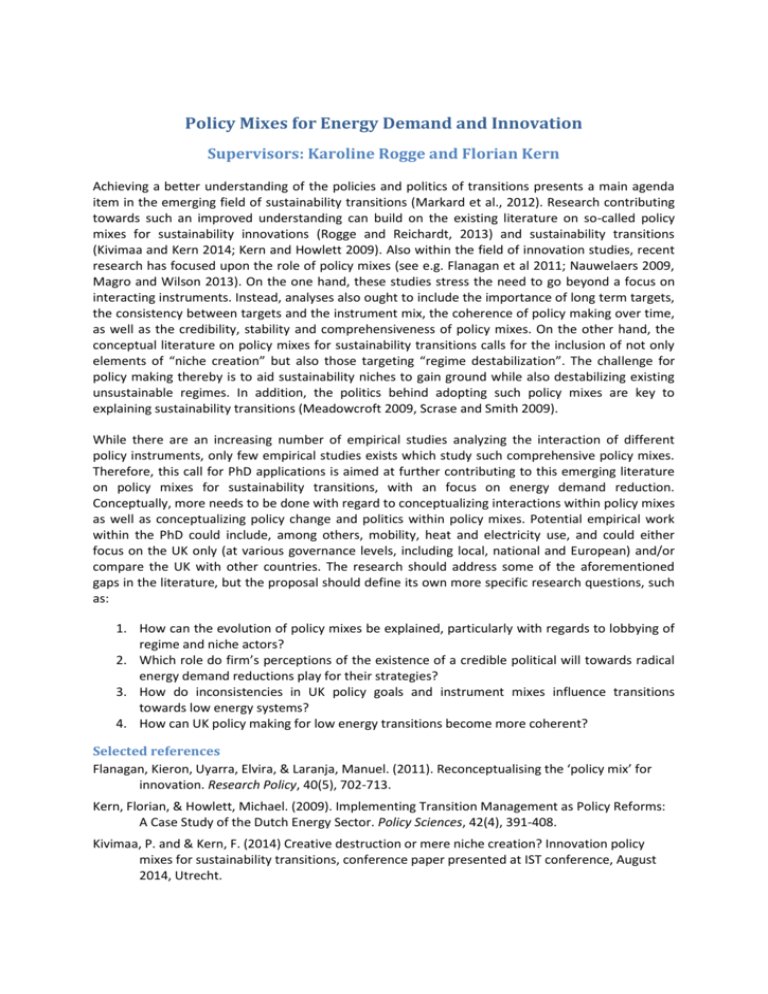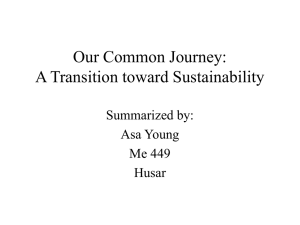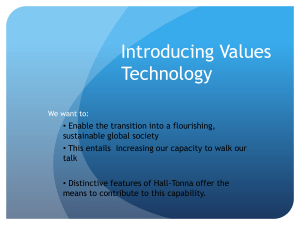Policy mixes
advertisement

Policy Mixes for Energy Demand and Innovation Supervisors: Karoline Rogge and Florian Kern Achieving a better understanding of the policies and politics of transitions presents a main agenda item in the emerging field of sustainability transitions (Markard et al., 2012). Research contributing towards such an improved understanding can build on the existing literature on so-called policy mixes for sustainability innovations (Rogge and Reichardt, 2013) and sustainability transitions (Kivimaa and Kern 2014; Kern and Howlett 2009). Also within the field of innovation studies, recent research has focused upon the role of policy mixes (see e.g. Flanagan et al 2011; Nauwelaers 2009, Magro and Wilson 2013). On the one hand, these studies stress the need to go beyond a focus on interacting instruments. Instead, analyses also ought to include the importance of long term targets, the consistency between targets and the instrument mix, the coherence of policy making over time, as well as the credibility, stability and comprehensiveness of policy mixes. On the other hand, the conceptual literature on policy mixes for sustainability transitions calls for the inclusion of not only elements of “niche creation” but also those targeting “regime destabilization”. The challenge for policy making thereby is to aid sustainability niches to gain ground while also destabilizing existing unsustainable regimes. In addition, the politics behind adopting such policy mixes are key to explaining sustainability transitions (Meadowcroft 2009, Scrase and Smith 2009). While there are an increasing number of empirical studies analyzing the interaction of different policy instruments, only few empirical studies exists which study such comprehensive policy mixes. Therefore, this call for PhD applications is aimed at further contributing to this emerging literature on policy mixes for sustainability transitions, with an focus on energy demand reduction. Conceptually, more needs to be done with regard to conceptualizing interactions within policy mixes as well as conceptualizing policy change and politics within policy mixes. Potential empirical work within the PhD could include, among others, mobility, heat and electricity use, and could either focus on the UK only (at various governance levels, including local, national and European) and/or compare the UK with other countries. The research should address some of the aforementioned gaps in the literature, but the proposal should define its own more specific research questions, such as: 1. How can the evolution of policy mixes be explained, particularly with regards to lobbying of regime and niche actors? 2. Which role do firm’s perceptions of the existence of a credible political will towards radical energy demand reductions play for their strategies? 3. How do inconsistencies in UK policy goals and instrument mixes influence transitions towards low energy systems? 4. How can UK policy making for low energy transitions become more coherent? Selected references Flanagan, Kieron, Uyarra, Elvira, & Laranja, Manuel. (2011). Reconceptualising the ‘policy mix’ for innovation. Research Policy, 40(5), 702-713. Kern, Florian, & Howlett, Michael. (2009). Implementing Transition Management as Policy Reforms: A Case Study of the Dutch Energy Sector. Policy Sciences, 42(4), 391-408. Kivimaa, P. and & Kern, F. (2014) Creative destruction or mere niche creation? Innovation policy mixes for sustainability transitions, conference paper presented at IST conference, August 2014, Utrecht. Magro, Edurne, & Wilson, James R. (2013). Complex innovation policy systems: Towards an evaluation mix. Research Policy, 42(9), 1647-1656. Markard, J., Raven, R., Truffer, B., 2012. Sustainability transitions: An emerging field of research and its prospects. Research Policy 41 (6), 955–967. 10.1016/j.respol.2012.02.013. Meadowcroft, J., 2009. What about the politics? Sustainable development, transition management, and long term energy transitions. Policy Sciences 42 (4), 323–340. Nauwelaers, Claire, Boekholk, P, Mostert, B, Cunningham, P, Guy, K, Hofer, R, & Rammer, C. (2009). Policy mixes for R&D in Europe. European Commission– Directorate-General for Research, Maastricht. Rogge, K., Reichardt, K., 2013. Towards a more comprehensive policy mix conceptualization for environmental technological change: a literature synthesis. policy mix concept. Working Paper Sustainability and Innovation (No. S3/2013). Scrase, Ivan, & Smith, Adrian. (2009). The (non-)politics of managing low carbon socio-technical transitions. Environmental Politics, 18(5), 707 - 726.






